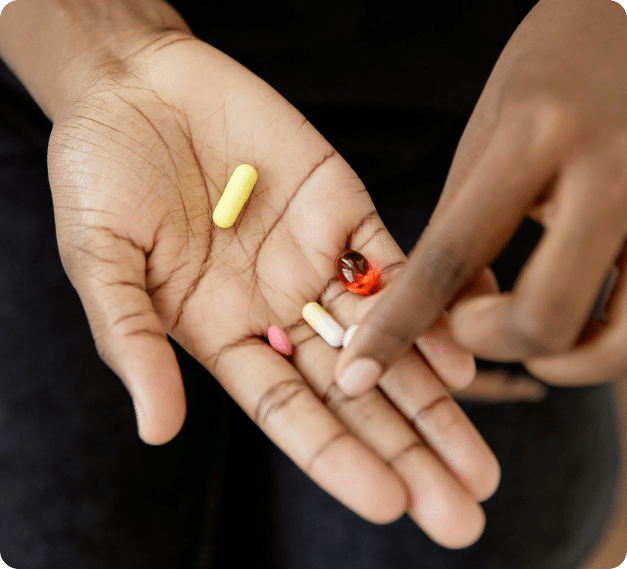
When you're thinking about fertility, it’s easy to focus on things like timing or medical treatments, but your everyday habits also play a big role in how easily you can conceive. What you eat, how much you weigh, how you manage stress, and even what chemicals you're exposed to can have a major impact on your reproductive health. Sometimes, these factors can create barriers to fertility without you even realising it.

Weight significantly influences fertility in both women and men, affecting hormonal balance, reproductive function, and the likelihood of conception. In Australia, over half of women and men of reproductive age are classified as overweight or obese, which can adversely impact their chances of conceiving and having a healthy baby.

The encouraging news is that even modest weight loss can improve fertility and pregnancy outcomes. Lifestyle modifications, such as losing 7% of body weight and engaging in at least 150 minutes of moderate activity weekly, can enhance reproductive health.
For couples trying to conceive, making these changes together can double the likelihood of adopting positive health behaviors, thereby increasing their chances of having a healthy baby.

What you put into your body matters more than you might think for fertility. Eating a balanced diet rich in whole foods will give your body the nutrients it needs to function at its best.
If your diet is lacking essential vitamins and minerals (think zinc, vitamin D, folic acid), it can negatively affect your fertility.
Poor nutrition can interfere with ovulation, while men may see a drop in sperm count and motility. On top of that, diets high in sugar, processed foods, and unhealthy fats can disrupt your hormone levels, making it harder to conceive.
Optimal fertility in both women and men. Engaging in consistent physical activity helps regulate body weight by balancing energy intake and expenditure, thereby preventing the adverse effects of both underweight and overweight conditions on reproductive health.

It's important to note that while moderate exercise is beneficial, excessive physical activity can negatively impact fertility by disrupting hormonal balance and menstrual function. Therefore, individuals should aim for a balanced exercise routine and consult healthcare professionals to tailor a plan that aligns with their fertility goals.
Engaging in smoking, alcohol consumption, and drug use can significantly impair fertility and reproductive outcomes for both women and men.

Female Fertility: Even light drinking can reduce the likelihood of conception. High alcohol intake during pregnancy is associated with miscarriage, stillbirth, premature birth, low birth weight, and fetal alcohol spectrum disorders (FASD). The safest option for women planning a pregnancy or who are pregnant is to abstain from alcohol.
The detrimental effects of smoking, alcohol, and drug use on fertility are reversible. Quitting these substances can improve reproductive health and increase the chances of conception and having a healthy baby. It's advisable to cease these activities several months before attempting to conceive.
Stress can have a significant impact on fertility, as it disrupts the delicate hormonal balance required for reproduction. Chronic stress triggers the release of hormones like cortisol and adrenaline, which can interfere with the production of reproductive hormones such as estrogen, progesterone, and testosterone.

This may lead to irregular menstrual cycles, anovulation (lack of ovulation), or difficulties in embryo implantation.
Stress has been linked to reduced sperm count, motility, and quality.
Additionally, stress often contributes to lifestyle factors such as poor diet, lack of exercise, or substance use, which further exacerbate fertility challenges. While stress is a natural response, managing it through relaxation techniques, counseling, or support from healthcare professionals can improve overall wellbeing and increase the likelihood of conception.

It’s not just what’s in your diet or body - it’s also what you’re exposed to in your environment. Everyday products we use, like plastics, cosmetics, and cleaning supplies, often contain chemicals that disrupt our hormones.
These endocrine disruptors, like BPA (found in some plastics) and phthalates (used in fragrances and personal care products), can interfere with your body’s natural hormone system and, over time, lower fertility.
In addition to household products, toxins in the air and water, like heavy metals (lead, mercury, cadmium), can damage both eggs and sperm.
While it's hard to avoid these toxins entirely because they’re so common in everyday life, repeated exposure can accumulate over time. It’s important to be mindful of what you're using and where you’re spending time.

Certain work environments expose you to chemicals, radiation, or heat that can harm your reproductive health.
For instance, people who work in agriculture or manufacturing may come into contact with pesticides, heavy metals, or industrial chemicals that can lower sperm count and impair egg health.
Jobs that involve prolonged heat exposure - like working in kitchens, factories, or steel plants - can also affect male fertility. Heat raises the temperature of the testicles, which compromises sperm production.
There’s also radiation exposure in some fields (like healthcare or research), which can harm both male and female fertility.

Ensures food safety, preventing infections that could impact fertility and pregnancy.
Adhering to these guidelines not only supports general health but also creates an optimal environment for conception and a healthy pregnancy.

Exercise is an essential part of a healthy lifestyle, but it’s all about balance. Moderate, regular physical activity helps keep your hormones in check, maintains a healthy weight, and reduces stress - all things that are beneficial for fertility.
Experts recommend at least 150 minutes of moderate-intensity exercise per week for the general population to maintain overall health and promote fertility. For individuals who are overweight or obese, increasing activity levels to 225–300 minutes per week, combined with dietary changes, can aid weight loss and improve reproductive outcomes.
Activities like walking, swimming, yoga, and cycling are particularly effective, as they can improve circulation, support hormone production, and help regulate menstrual cycles.

Ovulation and Menstrual Regularity: Regular exercise aids in achieving and maintaining a healthy weight, which is crucial for hormonal balance. This balance supports regular ovulation and menstrual cycles, enhancing the likelihood of conception.
Assisted Reproductive Technology (ART) Outcomes: Maintaining a healthy weight through exercise can improve the success rates of ART procedures, such as in vitro fertilization (IVF), by enhancing ovarian response and increasing the chances of implantation and pregnancy.
Sperm Quality: Regular physical activity contributes to weight management, which positively affects sperm parameters, including concentration and motility - improving male fertility.
It's important to note that while moderate exercise is beneficial, excessive physical activity can negatively impact fertility by disrupting hormonal balance and menstrual function - balance is key.

Creating space for mindfulness and self-care can be a powerful way to manage stress and support fertility. Try setting aside a few minutes each day for mindfulness practices like deep breathing, meditation, or yoga, which can help calm the mind and lower stress hormones like cortisol. Incorporating these into your daily routine can make them more sustainable.
Try starting your morning with a brief meditation or winding down with gentle yoga in the evening - or why not make time for activities that bring you joy. Spending time in nature, reading, or engaging in creative hobbies, can provide a mental reset and boost emotional wellbeing.
Connecting with others, whether through a support group, therapy, or simply talking to loved ones, can also ease the emotional burden of stress. By consciously carving out time for these small but meaningful actions, you can create a more balanced and nurturing environment for your fertility journey.

Quality sleep plays a vital role in supporting fertility and reproductive health for both women and men. Sleep is essential for regulating hormones that are critical for reproduction, including melatonin, which protects eggs from oxidative stress, and the gonadotropin-releasing hormone (GnRH), which supports ovulation and sperm production.
Poor sleep patterns or insufficient rest can disrupt these hormonal balances, leading to irregular menstrual cycles, reduced sperm quality, and increased stress levels, all of which can negatively impact fertility.
Establishing a healthy sleep routine can significantly improve both the quality and duration of your rest, supporting better fertility outcomes. Aim for 7–9 hours of restful sleep each night by maintaining a consistent sleep schedule, creating a calming bedtime routine, and minimising exposure to screens before bed. Better sleep not only enhances overall health but also creates an optimal environment for conception.
Try starting your morning with a brief meditation or winding down with gentle yoga in the evening - or why not make time for activities that bring you joy. Spending time in nature, reading, or engaging in creative hobbies, can provide a mental reset and boost emotional wellbeing.
Connecting with others, whether through a support group, therapy, or simply talking to loved ones, can also ease the emotional burden of stress. By consciously carving out time for these small but meaningful actions, you can create a more balanced and nurturing environment for your fertility journey.
Ensuring adequate intake of specific vitamins and minerals is crucial for reproductive health and pregnancy. The Fertility Society of Australia and New Zealand provides the following recommendations:

Folic Acid is essential for the healthy development of the fetal neural tube, reducing the risk of neural tube defects (NTDs) such as spina bifida.
Women planning to conceive should take a daily supplement of 500 micrograms of folic acid from at least one month before conception and during the first two months of pregnancy.
Higher doses may be necessary for women with a personal or family history of NTDs, those who are obese, take anti-epilepsy medication, or have diabetes. Consultation with a healthcare provider is advised to determine the appropriate dosage.
Iodine is vital for thyroid hormone production, which supports the baby's brain development during pregnancy.
Women who are pregnant, breastfeeding, or planning pregnancy should supplement their diet with 150 micrograms of iodine daily.
Vitamin D facilitates calcium transfer to the growing fetus and supports overall health.
Routine supplementation is not generally recommended unless there is a deficiency. Women at higher risk of deficiency—such as those with dark skin, limited sun exposure, or on certain medications—should consult their doctor about testing and potential supplementation.
Both Zinc and Selenium act as antioxidants, reducing damage from free radicals and potentially improving sperm quality in men.
Adequate intake through a balanced diet is typically sufficient. The recommended daily intake (RDI) for zinc is 8 mg for women and 14 mg for men; for selenium, it's 60 micrograms for women and 70 micrograms for men.
While a balanced diet can provide most necessary micronutrients, supplementation of folic acid and iodine is specifically recommended for women planning to conceive or who are pregnant. It's important to consult with a healthcare provider before starting any supplementation to ensure it aligns with individual health needs.
Additionally, stress often contributes to lifestyle factors such as poor diet, lack of exercise, or substance use, which further exacerbate fertility challenges. While stress is a natural response, managing it through relaxation techniques, counseling, or support from healthcare professionals can improve overall wellbeing and increase the likelihood of conception.

For a lot of people, falling pregnant is not as easy as it seems. Alongside fertility treatments and reproductive technology, there are plenty of lifestyle-based steps we can take first.
If you’re unsure where to start or want personalised advice, I can guide you in creating a tailored plan to optimise your lifestyle for conception. Schedule a consultation today to take the first step toward achieving your fertility goals.
Lifestyle choices, including diet, exercise, sleep, and exposure to environmental toxins, can impact fertility. Maintaining a healthy weight, avoiding smoking, and limiting alcohol intake can improve reproductive health.
Yes. A fertility-friendly diet includes whole foods, lean proteins, healthy fats, and antioxidant-rich fruits and vegetables. Reducing processed foods and sugar can also help regulate hormones.
Chronic stress can disrupt hormone balance, interfere with ovulation, and reduce sperm quality. Stress management techniques like yoga and meditation may improve fertility outcomes.
Excessive alcohol intake can disrupt hormone production, lower sperm quality, and reduce egg health. It is best to limit alcohol consumption when trying to conceive.
If you are under 35 and have been trying to conceive for a year, or over 35 and have been trying for six months, a consultation is recommended. Women with irregular cycles, PCOS, endometriosis, or other reproductive concerns should seek advice earlier.
Regular moderate exercise can help maintain a healthy weight and improve fertility. However, excessive high-intensity exercise can negatively impact ovulation and menstrual cycles.